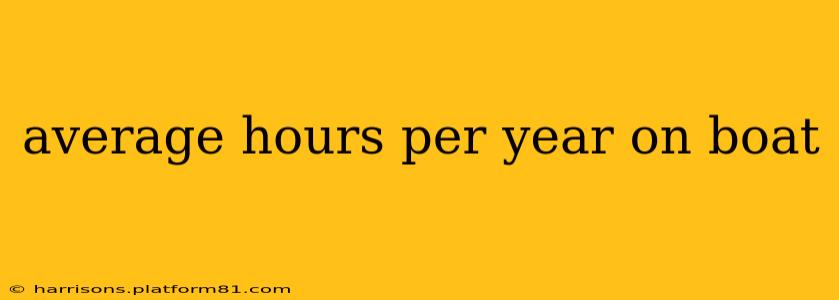For many, the dream of owning a boat revolves around sun-drenched days on the water, the thrill of the open sea, and the joy of sharing memorable moments with loved ones. But how much time do boat owners realistically spend on their vessels each year? The answer, unsurprisingly, is highly variable, depending on a range of factors. This article delves into the average hours per year spent on a boat, exploring the influencing factors and offering insights for prospective boat buyers.
What is the average number of hours per year people spend on their boats?
There's no single definitive answer to this question. Surveys and anecdotal evidence suggest a wide range, from a mere few hours for some owners to hundreds for others. Factors such as boat type, location, lifestyle, and personal commitments heavily influence usage. Owners of smaller, easily-accessible boats, such as kayaks or small motorboats, might log more hours due to their ease of use and lower maintenance requirements. Conversely, owners of larger yachts, requiring more significant financial and time investment for maintenance and upkeep, may spend fewer hours on the water proportionally. A reasonable estimate for many boat owners might fall somewhere between 20 and 100 hours annually, but this is a broad generalization.
How many days a year do people typically use their boats?
The number of days a boat is used directly correlates to the number of hours. Again, this varies dramatically. Owners in warmer climates with longer boating seasons will naturally use their boats more frequently than those in regions with shorter, more unpredictable weather patterns. Some boat owners might use their boats only a few times a year for special occasions, while others may use them weekly during the summer months. A realistic range might be from a handful of days to several dozen days per year, depending on the factors mentioned above.
What factors affect the average boat usage hours?
Several key factors influence how many hours a year a boat is used:
- Location: Living in a coastal area with readily available boating access significantly increases usage compared to inland locations. Proximity to lakes or rivers also influences frequency.
- Boat Type: Smaller, easier-to-handle boats tend to see more usage than larger, more complex vessels that require more preparation and maintenance.
- Climate: Favorable weather conditions greatly impact usage; inclement weather can limit or completely prevent boating.
- Lifestyle: Active individuals with more leisure time will likely use their boats more often than those with demanding jobs or family commitments.
- Boat Maintenance: The time and effort required for maintenance can influence usage; high-maintenance boats might discourage more frequent use.
- Cost of Operation: Fuel costs, mooring fees, and other operational expenses can also influence usage, especially if these costs are high.
Does the type of boat significantly impact usage hours?
Yes, absolutely. A small, inflatable dinghy is far more likely to see frequent, short trips compared to a large sailboat requiring extensive preparation and potentially longer voyages. Similarly, a fishing boat will likely see higher usage among avid anglers than a luxury yacht primarily used for occasional social events. The boat's intended use and the ease of its operation are major contributors to usage frequency.
How can I estimate my potential boat usage?
Before purchasing a boat, honestly assess your lifestyle, available time, and budget. Consider these questions:
- How often do you realistically see yourself using a boat each year?
- What is your proximity to suitable waterways?
- What type of boat best suits your needs and lifestyle?
- Can you afford the ongoing maintenance and operational costs associated with your chosen boat?
Answering these questions honestly will help you determine if boat ownership is feasible and align your expectations with realistic usage patterns.
Conclusion
The average number of hours spent on a boat each year is highly individual and depends on a multitude of interacting factors. While a broad range of 20 to 100 hours might offer a general guideline, the true figure for any individual owner will depend on their unique circumstances. Careful consideration of these factors before purchasing a boat is crucial to ensure a satisfying and fulfilling boating experience.
